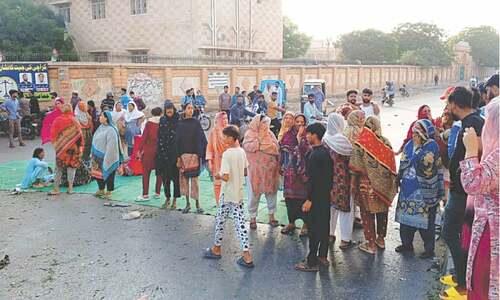KARACHI: The World Bank has agreed to work together with the Sindh government for making the Sindh Solid Waste Management Board (SSWMB) more effective and introduce changes in cropping patterns to improve rural economy.
This agreement was reached here on Friday during a meeting between Chief Minister Syed Murad Ali Shah and World Bank country director Patchamuthu Illangovan here at CM House which was also attended by chairperson of planning and development (P&D) Naheed Shah.
The chief minister said that SSWMB needed capacity building so that it could work scientifically.
The WB country chief said that he would send solid waste management experts to the Sindh government and through P&D a detailed plan would be worked out to improve capacity of the body so that not only its efficiency in solid waste disposal and management could be improved, but it must become a self-sufficient organisation.
It was agreed that SSWMB’s capacity building would be increased in such a way that it could work all over Sindh in different phases.
In the first phase it would start work in divisional headquarters and then in district headquarters.
Cropping patterns
“Our growers are engaged in traditional crops of high deltaic and low yield. I want to introduce major changes in cropping patterns in which low deltaic crops can be grown with high yield,” he said and added this would improve rural economy.
“A separate cropping system should also be developed for small growers. We have to improve their income by switching them over to orchards-cum-cash crops,” Mr Shah added.
Mr Illangovan said that he would bring global agricultural experts here with him and would have their meeting with the agriculture department and P&D experts.
The chief minister also said that the provincial government was working in mother and child health and nutrition programmes in different districts, including Thar. This programme has produced some good results.
Funds for NICVD
The chief minister while presiding over a meeting of the National Institute of Cardiovascular Diseases board here at CM House said that his government would meet financial requirements of NICVD and its eight satellites because it was delivering “best service” in the region.
They meeting participants were informed that during 2019, up to August 31, the NICVD Karachi by Aug 2019 performed 6,385 angiographies and 2,399 heart surgeries while it provided treatment to 779,311 patients.
The NICVD has established eight satellite centres all over Sindh which are located in Larkana, Tando Mohammad Khan, Hyderabad, Sehwan, Sukkur, Nawabshah, Mithi and Khairpur.
Earlier the NICVD director told the chief minister that they needed funds of around Rs5 billion immediately so that the expenditures of free of cost patients could be met.
The chief minister directed secretary of finance Hassan Naqvi to sit with the NICVD executive director to meet the financial requirement as the facility was delivering “best service” in the province and it must be strengthened in all aspects.
State land for graveyards
The Sindh government on Friday decided to allocate state land for graveyards in Karachi as existing graveyards of the metropolis had already been filled. This decision was taken here in a meeting which was chaired by Chief Secretary Syed Mumtaz Ali Shah.
The meeting was informed by the commissioner that no more space was left for burials in graveyards of Karachi and there was an immediate need of new graveyards in all six districts of the city.
The metropolitan commissioner informed the meeting that there were 203 graveyards under the administration of the KMC in the city.
Out of 203 there are 184 graveyards of Muslims, 12 Christian graveyards, five graveyards of Hindus and one each for Jews and Parsis.
The KMC is also developing three new graveyards in the city at Surjani Sector 16, Link Road N5 on the Superhighway and at Tehsar, Gadap Town.
“Graveyards in Karachi are out of space and there is an immediate need of new graveyards in all six districts of the city,” said the commissioner and added that there was a dire need of allocating more land for graveyards not only for Muslims but also for minorities in the city.
He directed the member Board of Revenue to reserve from the available state land 300 acres in Gadap, 200 acres in Bin Qasim and five acres in Korangi for graveyards and a summary in this regard will also be moved in Sindh cabinet for approval.
The chief secretary also directed commissioner of Karachi and all deputy commissioners to indentify more available state land for graveyards in districts West and East of Karachi.
Published in Dawn, September 28th, 2019















































